#going on. he takes whatever Caligula is doing up to a new and also worse level. fascinating.
Note
Hey just wondering who is your favourite Julio Claudian emperor?
caligula, no competition. my bio on here used to read ‘full time cassius apologist, part time caligula apologist’
#fuck the rest of those guys. Nero can stay for a second tho I need to figure out what was up with the whole gender of theater thing#going on. he takes whatever Caligula is doing up to a new and also worse level. fascinating.#idc abt the rest. literally my brain turns off once Caligula gets assassinated. I would not be able to tell you anyone’s names past#him. I also cannot tell you anything abt the Roman Empire past him. Caligula is the hard cut off for me#ask tag
22 notes
·
View notes
Text
“What have you done?” : Why Riordan’s Handling of Triumvirate Holdings Sucks
I put my thoughts under a cut to make it easier to avoid spoilers and to save you all from a long post,,,like a really long post.
Basically, I think it was inevitable that Riordan fumble Triumvirate Holdings. He simply designed a villain network too powerful and too extensive to ever be handled properly by the heroes. He did try to address,,,some of it, but in the end I think he just made it worse.
I. Let’s talk about Triumvirate Holdings.
The way that Riordan established the origins of the Triumvirate and the extent of their power made it too big to handle from the beginning. The emperors have been around for centuries. It’s mentioned countless times how much property they own, how much money they have, and how many businesses are actually under their control. Rachel says it well in Hidden Oracle: “They make my dad’s company look like a kid’s lemonade stand.” Nero brings it up again in Tower of Nero: “What you don’t seem to realize, Apollo, is that you can’t destroy bank accounts with a bow and arrows. All my assets, all the power I’ve built up for centuries -- it’s all safe.” Think of what Caligula did to Piper and her dad, how deep that ran and how many people were involved. Think of how the Triumvirate funded both Luke and Octavian. All of this goes to show how deeply rooted Triumvirate Holdings is, especially -- unlike other villains -- in the mortal world.
This never really gets taken into account. For instance, Apollo does wonder if Meg will inherit Nero’s tower, but it seems as if she doesn’t, nor do any of the other imperials who go with her to Palm Springs. They live off of the Sibyl’s tarot card business, which strongly implies that they took nothing from the tower -- or the company -- at all.
Apollo also mentions Camp Half-Blood getting the weapons and Greek fire from Nero’s tower, but that is so poorly thought out that I want to scream. Nero had designed special holding tanks for the Greek fire, tanks that Rachel pointed out could be mistaken for a water-treatment facility. And we’re transferring it to a summer camp? Yikes.
Beyond the question of the material, there’s the question of personnel. Mortals, demigods / legacies, monsters, Germani, etc. were all involved with Triumvirate Holdings. I’ll address the Germani in a moment, but the sheer numbers involved make the fall of the company either impossible or devastating. It is conceivable that the mortals, business people and mercenaries alike, could move on and the Mist would do its work. Still, that’s thousands of people jobless. The unemployment rate just skyrocketed. Further, the monsters once under Triumvirate control are now presumably free to cause havoc as well.
Before moving on entirely, multiply all of that by three. Commodus and Caligula employed mortals and monsters as well, and who knows what happened to their material possessions. (Besides the fifty yachts in San Francisco Bay, ofc. Millions of dollars, minimum, at the bottom of the ocean.)
What I’m most concerned about, however, are the demigods / legacies, especially those raised by or who spent considerable time with the Triumvirate. An experience like that shapes people, and not for the better.
II. Let’s talk about the Imperial Households.
Starting with Nero’s household, I think it’s clear that Riordan brushed over the imperials to have his wholesome ending, which is entirely understandable. Even so, he creates such a conflicting view of them that his “they all moved to Aeithales and Healed” bit is so shallow. Apollo’s views in particular cause this problem.
Initially, the fact that the imperials are enemies puts them in this strange category where they’re minors and people (like Meg) but them being harmed or even killed,,,isn’t a bad thing? Chiron, directing new campers during the Greek attack on the tower, yells, “Try not to kill enemy demigods or mortals! Okay, well, from now on, then!” It’s given the weight of a throw-away line. Apollo later goes so far as to think, “I wondered where the other three missing adoptees had gone -- if they’d been captured or had fallen in battle to Camp Half-Blood. I tried not to feel any satisfaction at the thought, but it was difficult.” (Emphasis mine. Oh, and if anyone is interested, this is almost an exact parallel to what Apollo says in Tyrant’s Tomb about Octavian’s death.) I’m not saying that Apollo hasn’t really changed or that heroes have to value the lives of their enemies, but this isn’t the best foot to start on.
In Nero’s throne room, when Meg gets her imperial siblings under control, Apollo comments on how close they are to siding with Nero: “[Meg] reminded me of one of Hades’s dog trainers working with a pack of new hellhounds. ...any sign of weakness from her, any change in the temperature of the battle, and they might break ranks and slaughter everyone in sight.” Even after Nero’s death, the imperials break down. Raging, sobbing, catatonic -- whatever the case, not exactly the best candidates for a smooth adjustment to ordinary life.
Apollo and Meg briefly chat about how the household will need support to heal, but Apollo still notes, with some real hesitancy, “There were no guarantees. The imperial demigods had dealt with so much for so long, some of them might never be able to come back from the darkness.” A short while later, at Aeithales, Apollo observes that the imperials “seemed determined to garden, as if their sanity depended on it, which perhaps it did.” While Cassius, at the very least, seems to be adjusting well, who’s to say that the others are? They can’t garden forever. I just can’t picture this ending as well as Riordan leaves it.
All of that is bad enough, but we know that Nero’s “household” is larger than just the twelve demigods he adopted, and it’s likely that Commodus and Caligula had similar households. Remember Marcus, Meg’s escort in Dark Prophecy? Whether he was one of Nero’s twelve (and got replaced) or not, his existence is evidence that there are far more demigods / legacies involved than the series’ focus would make us think at first glance. We do see members of Commodus’ household in Dark Prophecy, in the stands of the stadium and in the battle against the Waystation -- “a few dozen” even. Interestingly, Caligula is the only triumvir who doesn’t seem to have a household at all, as they’re never mentioned aboard his yachts. That may be exactly as it seems, with him preferring not to have a household out of paranoia. However, I still think it’d be more reasonable to assume that he had some kind of household than to assume otherwise.
Nero’s household appears to have been the most imperial and the most like a family, but that doesn’t mean we can brush off the other households as a non-issue. Considering the lack on information on the subject, it’s entirely possible that the other two emperors did adopt kids. In any case, we can’t judge the loyalty of these unknown demigods / legacies, and they certainly seem to have fallen through the cracks. It’s doubtful that Nero’s children will be able to “heal” even with Meg’s help and a place totally removed from their old life. If the others don’t have any kind of support system? If they’re left to their own devices? That’s a recipe for disaster. They’re likely to cling to the system they know in whatever ways they can.
As a bit of a thought experiment to drive this home, consider: what would Octavian do if he were part of Triumvirate Holdings when the news arrived that the emperors were all dead? I think it’s clear than the answer is not “go live a normal life and pretend the Triumvirate never existed.” It would be naive to think that not a single person in the Triumvirate’s sphere is willing to step up and take over.
III. Let’s talk about the Germani.
Riordan actually explained this well, but then proceeded to fuck up.
I had questioned why the Germani -- ordinary legacies / humans -- could be turned to “monster” dust once resurrected and put in an emperor’s service. What kind of afterlife did that mean they had? Thankfully, Riordan touched on this! As @triumvirateds pointed out on my older post, the Germani -- like most ordinary monsters -- did come back in a day or two after being killed. This apparent immortality, we find, is tied to the Triumvirate’s power, symbolized by each emperor’s fasces. When the Germani were revived, however the Triumvirate accomplished that, they became removed from any usual afterlife until released from the Triumvirate’s service and made “regular people” again.
(This does raise some technical questions. Were each group of Germani tied to a specific emperor? Meaning that the troops on the West coast were “released” when Commodus’ and Caligula’s fasces were destroyed? I’m fairly certain that they still turned to dust during the final confrontation with New Rome. That would imply that their loyalty was tied to the Triumvirate as a whole, and their bond transferred to Nero’s fasces with the power of the other two emperors.)
However, I can’t believe Riordan decided that the Germani would simply be regular people after Nero’s death. Throughout the series, Apollo often remarks that the Germani are a threat because of their loyalty. Remember when the Germani were described as “sensitive about insults to the Imperial person” and nearly killed Apollo for looking at Nero wrong? Well, now Apollo says, “I supposed none of them loved the idea of staying loyal to the cause of a dead emperor.” I’m reminded of when, after Commodus and Caligula were defeated in New Rome, the army ran away and was never mentioned again. In both cases, the Germani are brushed off as disloyal / uncaring and no thought is given as to how they’re supposed to integrate into modern society.
“But wait,” you might argue, “They’re mercenaries. Many of them, like Luguselwa, probably don’t care about the emperors.” Sure. There’s definitely a long history of mercenary troops not being the most loyal, especially when there isn’t a clear leader. However, I have to bring up the fact that when Nero died (in actual history) the German guard was disbanded by one of the following emperors due to their perceived loyalty to Nero, even in death. (Also, because the guard was disbanded for their loyalty, which was a major insult, the entire tribe revolted.) That’s a bit of an oversimplification of ancient history, but with the constant reminders we have in the series about the Germani’s loyalty, this ending just seems like a cheap move by Riordan. He might as well have had them all turn to dust one last time with the dissolution of the Triumvirate’s power. Also, if you even entertain the possibility that someone could step forward to take control of Triumvirate Holdings, I feel that the Germani would serve whoever that was.
On the purely practical side of things, please try to imagine thousands of (possibly illiterate) barbarians adjusting to modern life with zero help. I’m not saying it’s impossible, considering the amount of time they’ve been around (and how they seem to legally exist, as evidenced by Luguselwa being Meg’s legal guardian), but it’s still a stretch of the imagination with how Riordan characterized them throughout the series.
TL;DR
To wrap it up, you just can’t make villainy this pervasive, throw out some guesses as to how things will work out fine, and pretend the world can just move on. Triumvirate Holdings isn’t a snake that dies when you cut its head off; it’s a hydra. The life that almost everyone involved in Triumvirate Holdings lived makes them who they are. Not everyone will end up like Meg, especially considering the sheer number of people impacted. I know that all of this isn’t really Riordan’s concern, that he couldn’t have covered even half of this if he wanted to, but gods does it bother me.
#trials of apollo#toa#tower of nero#tower of nero spoilers#triumvirate holdings#long post#filodox!#I'm sorry for going off about this but I had to#I'm not trying to be cynical#I just really love Triumvirate Holdings#I'm the kid who won't let the company die#I'm suing CHB for property damage#I apologize for the quality of my writing btw#I gave up trying to edit bc I would never be happy with it
36 notes
·
View notes
Text
Demigod’s Grief Ch. 4
Thalia
Thalia had begged Artemis, to at least let her see her brother’s funeral. Artemis had been hesitant, but Thalia had refused to back down. Insisted that she would leave anyway, with or without Artemis’s permission.
She had fully expected Artemis to take away her gifts. To tell her that if she left, Artemis would no longer consider her a huntress.
At that moment Thalia no longer cared.
But Artemis allowed her to leave the hunt. Allowed her to go see her brother’s funeral. Artemis had given her a few provisions, including a couple of beads that would allow her to be transported back to the hunt when she was ready to rejoin them.
Artemis had insisted that she take one of the hunters with her. That she would need someone there. Thalia hadn’t cared, so Artemis sent Iphigenia with her, one of the more levelheaded hunters.
Artemis smiled at her sadly before waving her hand, and Thalia and Iphigenia were transported to Camp Jupiter.
---
Thalia blinked as she appeared just outside Camp Jupiter. Iphigenia looked at her, waiting for Thalia to make the first move.
For a moment Thalia couldn’t move. Afraid of what she would find, when she asked to see her brother.
She looked at Iphigenia, dead dad, killed by her mom, then her brother killed her mother. Who was then hunted by furies for killing his mother?
Iphigenia’s brother had been told to kill his mother by Apollo as well.
Was there anything Apollo did, that didn’t make anyone’s life worse?
That hardened her resolved and she took a step, she had been Told that Apollo was escorting her brother, she needed to see him, to… talk to him.
Thalia stalked forward, Iphigenia following her.
Guards rushed her, Thalia’s hands sparked with electricity, she felt a hand on her shoulder.
“Calm Down” Iphigenia insisted. “This is how we get locked away, not how we get them to let you see your brother.”
Thalia took a deep breath, and the electricity on her hands went away. “I am Thalia grace, sister Jason Grace former Preator of the twelfth legion”
Some of the guards lowered their weapons, others kept the raised. “We shall take you to the Praetor”
Thalia nodded when some of the male guards tried to grab her, she hissed. “I am a hunter of Diana, don’t touch me.” Iphigenia nodded beside her. The guards immediately let her go, but she kept walking beside her.
“Praetor,” The Guards said when the entered the room. Reyna was sitting on her throne, two dogs made of gold and silver were sitting alert at her heals, and in front of her was Apollo and Meg.
“You!” Thalia cried. “What do you think you're doing here? Do you think you have the right, to handle my brother’s body after you got him killed?”
“Thalia-” Apollo tried. But Thalia’s fingers were already starting to spark.
“You should have left him alone,” Thalia said. “He was happy. He was finally away from all this danger, and you just tossed him, back in. Do you even care? Of course, you don’t, you gods never change.”
Meg stalked forward, but Apollo placed a hand on her and shook his head Apollo didn’t say anything. He turned to Reyna, “Should I leave you to speak with Jason’s sister?”
Reyna’s eyes flicked to her, before turning back to Apollo, “We’ll talk later.” Apollo nodded once before he and his little master walked out leaving Thalia, Iphigenia and Reyna alone.
Thalia turned to Reyna. “I would like to see my brother.” She said.
Reyna paused for a moment before she nodded. “Of course.”
She stood and walked away. “He mentioned you on occasion,” Reyna said. “He never really forgot you.”
Thalia smiled a little. It was the first smile she had given in days.
Reyna walked down to the funeral home, where Jason’s body was kept, lying in wait. She stepped forward and opened the door.
Thalia entered the building and found a man flipping through a magazine at a desk. He looked up and saw Reyna.
“She wishes to see Jason,” Reyna said her head jerking in Thalia’s direction.
Thalia took a deep breath, Iphigenia put a hand on her shoulder.
The man nodded and stood, he took out his keys and lead them to another room. This room was kept colder. There was a figure lying down ahead and Thalia almost felt her throat close.
She ran ahead and stared down.
He was resting in a coffin a dark toga was wrapped around him. His hair was brushed back, glasses framed his face. Thalia looked at him and clasped his hand. “I miss you, little brother,” Thalia said tears rolling down her cheeks.
Thalia looked back at Reyna, and back at her younger brother. She could still see the scar on his lip from when he bit the stapler.
He had always been braver than her. He was the one who could fly. Not her, who was too scared of heights to try.
She broke down crying. “I’m sorry. I should have been there. I’m so sorry.” Thalia clasped his hand tightly. “Maybe if I had been there, I could have prevented this stopped Apollo from making you go,” Thalia said. “I’m so sorry.”
Neither Iphigenia nor Reyna said anything. Thalia wasn’t entirely sure if they were even still there.
She kissed her brother’s cheek. “I’m so sorry” She whispered.
---
She met Apollo again as she was leaving the building. He was avoiding her gaze; she clutched his arm. “No,” She told him. “You don’t get to see him.”
Reyna stepped in. “Thalia, maybe you should- “
Thalia shook her head. “You said I had a say. I don’t want him anywhere near Jason.”
Iphigenia coughed. “maybe you should- “
Apollo nodded once. “if that is your wish,” He said before he turned and walked away.
---
Thalia stayed, looking over the plans for the funeral, while Apollo was off with Reyna doing whatever he had roped her into. Iphigenia occasionally gave some advice but for the funeral but all in all, she stayed quiet.
The next she heard; Apollo was in the infirmary. Reyna was fine as far as she knew. Maybe scarred.
Thalia hadn’t honestly cared, the only reason she left her plans was out of idle curiosity.
Apollo was lying down, his eyes were closed, bandages covered every inch of his body. The only part of him that wasn’t covered was his chest, where a giant scar rested just beside his heart. Meg was sitting up in a bed next to his, she glared at Thalia as she walked in.
Thalia looked at it confused. “Where did he get that?”
“He doesn’t want you to know,” Meg said. “Leave him alone!”
Thalia backed away. “Kind master aren’t you.”
Meg threw one of her rings at her. It transformed mid throw into a sword, Thalia ducked just before it hit her face. “What is-”
“Leave!” Meg cried.
Thalia hesitated for a minute, but Meg threw another ring at her Thalia ducked away and left before meg could toss something else.
---
“I don’t understand why she’s so protective.”
Iphigenia shrugged. “Same reason we’re so protective of Artemis?”
“Artemis didn’t send people to their deaths.” Iphigenia turned to stare at Thalia, her dark eyes calculating.
She remembered Iphigenia’s family. Father dead, killed by the mother, mother killed by my brother on the orders of Apollo.
She clenched her fist. “You must hate Apollo too.”
Iphigenia shook her head. “No, I’d have to hate Artemis too.”
Thalia turned to Iphigenia.
Iphigenia smiled a little. “Artemis asked for my father to sacrifice me, so she would allow them to go to war. In the last moment she saved my life, but the damage was done, my mother refused to believe that I was alive, and she plotted my father’s death, killed him, and yes, Apollo sent Orestes to kill my mother, but he also protected Orestes from the Furies when they attacked him for that act. And it all started with Artemis asking my father to sacrifice me.”
Thalia hadn’t remembered that part of the myth.
“How can you forgive her?”
Iphigenia shook her head. “I chose too, I didn’t want to spend the rest of my life angry. And she did save my life, she did regret her actions, she told me herself.”
Thalia sighed. “I just can’t.”
Iphigenia nodded. “I understand. Just maybe hear what he has to say before you decide you hate him forever”
---
Meg refused to leave, but something told Thalia that she needed to talk to Apollo, ask him about the scar.
“I need to talk to Apollo,” Thalia said.
Meg shook her head. “leave him alone” Meg said.
“I just want to ask him about his scar.”
“He stabbed himself in the chest to help Jason and me, what’s there to ask?” Meg said. “Are you going to mock him, because his plan failed, it already hurts him, leave him alone.”
Thalia’s looked at Meg. “What?”
“Caligula needed his essence to become the new sun god, in an attempt to bargain, Apollo threatened to kill himself so Caligula couldn’t get what he wanted. Caligula refused, he stabbed himself, Medea ran to fix him, her concentration broke and Jason broke free of the venti controlling him.”
Thalia's eyes went to the infirmary. “What?”
Meg turned away. “So please. Leave him alone. He’s been through enough.”
Thalia paused. “tell, tell Apollo he can come to the funeral, and that, that I’m sorry. I didn’t know.”
Meg didn’t say anything.
---
The Funeral went by quickly. Lots of crying, lots of music. Thalia had been asked if she wanted his body cremated or buried. Thalia had asked for a cremation, ashes could be moved more easily if they were in an urn, and Thalia was unsure if she wanted his remains to stay in Camp Jupiter.”
They burned his body and collected his body in an urn. The presented it to Thalia who held it tightly.
Apollo hovered in the back. When the funeral ended, he turned and left.
Thalia wanted to go after him, talk to him but what do you say after realizing you were wrong?
---
She held the urn in her hands and stared up at the sky.
So, Apollo was braver than she thought. She couldn’t’; t believe she had had him so wrong before. Apollo? Artemis’s annoying younger brother, was about as selfless as they come? Her brother would have been so disgusted with her if she found out how she treated Apollo.
That was assuming Meg wasn’t lying of course. But something told her that Meg was being honest.
She saw Apollo ahead, apparently, the next prophecy had a stipulation of being around June, so Apollo had a bit of time off before needing to leave. He spent most of that time in the training grounds, practicing his sword fighting, and archery.
Thalia hesitated, then walked forward.
“Hey”
Apollo paused and turned glancing at her warily. “Yes?” He asked.
She paused and thought about it. She wanted to confront him about what he had done on Caligula’s ship, but she found herself incapable.
She licked her lips. “Can you fly?”
Apollo looked at her shock. “What?”
“Can, could you fly… back when you were immortal, without transforming into a bird, or a fly, or something.”
Apollo scrunched his face as though trying to remember. “I think so?”
“Think?”
Apollo looked away. “My memory hasn’t quite been the best since I was turned human.”
Thalia nodded. Apollo stared at her for a moment.
“Why?”
Thalia shrugged. “I’ve never tried it, never thought I could, then my brother revealed to me he could fly, and… I- well I- “
“It’s a mixture of faith, belief, and trust in yourself and letting yourself fall,” Apollo said. “You have to control the winds around you, and concentrate or else you’ll fall, and since your mortal, probably die”
Thalia nodded. “Thank you.”
---
Thalia had given Iphigenia one of the beads and told her to go back to Artemis. When Iphigenia argued Thalia had said that she was better, and but had still wanted to spend some time away from the hunt. Iphigenia had nodded, had promised to explain everything to Artemis before breaking the beads.
Thalia practiced and practiced and practiced. Before it had just been a way to speak to Apollo, but now… now it felt like something she should try. A way to keep her closer to Jason.
Apollo helped, or tried, he couldn’t remember much, but what he did was helpful.
After a couple of weeks, Thalia became impatient, so she climbed a hill and looked over the city, it was high up. She could feel her heart beating so fast. She hated heights, she tried hard to avoid them, hadn’t been up so high since the quest to find Artemis years ago.
She closed her eyes and felt the wind whip around her. Stepped back and jumped.
Later she would say it was the greatest feeling in her life.
A/N So... yeah, hope you all like it. I did take a little from roman funerary practices. The crying women, the music, Jason wearing a dark toga. That kind of stuff. I hope I remembered it all.
Thalia kissing him is something I got from wikipedia. The closest living relative gave the deceased a kiss and closed his eyes, but Jason’s eyes were already closed. So... (Also got the ‘dark toga’ from their too.)
Everything else i got from here
31 notes
·
View notes
Text
I’m still on a break from that awful fiction book. Nearly done with it but still annoyed with it for being so terrible.
Instead, here’s the next chapter of “Facts for he Married”.
As an aside, you cannot read this man’s medical books without basically reading them as that insufferable Leigh character from his fiction book because Leigh is him with a different name.
Anyway.
I got through a good few paragraphs of the third "case study" in Facts for the Married before realising that interruption wasn't talking about in conversation.
Apparently, the third anecdote here is about a couple who is just bad at sex.
Which, of course, is entirely the wife's fault, according to the author because how could a man be wrong or not good at such a thing?
It goes a little off the rails pretty quickly with, "No nation can last whose social life is one of sensuality and sex perversion. History has shown this fact. But, however much we may look back upon the times of Nero or Caligula or try to imagine the Eleusinian orgies, we should try to remember that such things as were done and said were at least open and public matters and as such could have been regulated, had a high moral standard been in existence." He’s just saying shit like this to the two people in his office for their appointment unprompted.
I guess regulated public orgies would be moral though. I’m not sure--how--but there we go.
"And what is a prettier sight in the world than a plump mother with a plumper baby?" A lot of things, if I'm being honest. He's talking like he's trying to sell them off to a butcher.
He's finally moved on to the totally real and not something he just made up couple and we've got a pale, thin husband and an irritable, twitchy wife. She’s described in the sort of way where you just know the author wants to call her bitchy or worse but Swears Are Not Allowed, so she’s just “irritable and nervous” and occasionally ‘shrew like”.
The totally real husband starts trying to explain the relationship issues with his wife, like a normal person might, and the doctor cuts him off about five words in and essentially tells him to shut up with his complaining then tells him he needs to start living according to the laws of nature and, at 39, there's no excuse for him to have--loss of stamina, as well as the "fact" that all the drugs in the world won't fix his wife being a frigid, nervous bitch.
Little harsh.
"You fear impotence, and your fear is justified," is probably not a statement that is helpful here, especially since the guy just explained that that’s literally one of his problems. For some reason, I got the image of this doctor sort of looking down his nose in an inappropriately appraising way at the guy when he said that.
He goes on and tells this poor guy that he's also got a shite memory, doesn't know how to sleep correctly, has headaches, has no idea what he's doing or talking about because the guy never mentioned any of this, and at one point the guy tries to agree with him then explain more.
"Sometimes, I feel--"
"Yes, no need to waste your energy in telling me," and he goes off describing more 'problems' this guy has because he's good enough to read minds I guess. This man is a terrible doctor both for his wildly inaccurate advice and for the fact that he doesn’t listen to his patients.
At this point, we find out the absolutely real wife is sitting RIGHT THERE (she had only been mentioned as having existed previously and the writing was such that it read like just the Doctor and the poor guy trying to explain his problems) and interrupts (the conversational type this time) the doctor that another doctor told them that her husband had spinal issues, and THIS doctor just sort of went with, "Whatever, he was a quack. I'm a real doctor."
"But did you tell him and the others you have been to that you lived unnaturally?"
Okay first of all, what?
Second, she tells him no and gets berated for not knowing she was "living wrongly" and I assume sarcastically asks if her husband even objected to her trying to tell other doctors they were normal people.
He tries to answer, gets interrupted by the doctor again who somehow knows that, before this couple got married, she told him she didn't want kids and he was cool with it.
...and that's why they're bad at sex, because they don’t want children. That's the long conclusion. I have to admit, I’ve never wanted children and I don’t think I’m necessarily bad at the sex thing. Then again, I haven’t tried to drag up the ghost of Dr. Howard to ask his opinion and I kind of want to because I’m definitely the sort of unnartually wrong living sort that would probably kill him a second time just by being in the same room with me.
The doctor sits there for seven pages berating her for not wanting to have kids, that her husband needs to start demanding babies be made and if she refuses and cuts him off it's entirely her fault if he cheats on her.
Since the husband appears to be a reasonable person, despite the author's attempts to write him as completely useless, he tries to explain that he doesn't really want to do that, that it's beyond inappropriate to demand his wife have children if she doesn't want them, he was perfectly okay with this while they were dating and when they got married and that it’s her choice (you know, a reasonable, normal response--just not for 19--when the hell was this one published? 1912.) and, of course, gets cut off by the doctor again so he can berate him for being useless and spineless in one breath and stopping just short of calling his wife a frigid bitch for refusing to get pregnant.
We're introduced to a third sex: Neutered. While I know that sounds amusing, all it means is that you’re not conforming to prevailing gender role expectations of the time so you’re no longer a man or a woman you’re a ‘neuter’. He also briefly mentioned it applies if some sort of surgery is required that leaves one sterile or if they end up with a disease that makes them sterile.
I don't--think that's how it works but, okay, sure, why not?
So, they both stop trying to explain to the doctor that he's being an idiot (which he is) and he orders them to go home and start being less terrible at sex--no advice as to how, it was pretty much just, “Go home and have, like, at LEAST two kids then you’ll be fine,” at which point he'll stop being--how was the husband described? Pale and thin; he'll stop being pale and thin and presumably also stop being a spineless wreck and she'll be much less of a frigid bitch once she has babies plural.
I'm a bit concerned at this point he's going to make good on the threat of giving "explicit advice and instructions" but will also be kind of disappointed if he doesn’t.
Wife is used as a verb a few times, in reference to older men ditching their first wives and grabbing a "young girl" as a new one and THOSE men deserve "nothing but contempt from their young wives". Don’t use wife as a verb, though, unless you’d like whichever person you do that to to give you a well deserved punch in the teeth for it.
The reason for that is--that hypothetical older guy she’ll jump to once she gets tired of Mr. Spineless here, will either make her a nervous wreck by being even more terrible at sex (because if he were any good at it he could have kept his first wife and she wouldn’t have walked the second the kids were grown, of course) and it's his fault because he's repeatedly insulted her and "starved her to desperation" by being terrible at sex. I don’t know why he’s talking about this, at no point did this couple express the desire to get divorced or get a sugar daddy involved.
I'm not sure how this is applicable to the 100% real couple in the room with this doctor.
He finally starts rambling on about old men and young women and tells him to not jump back into it because he can't risk any strain on his vitality, "what little you have left" (quit murdering the guy, Doctor, damn...), and needs to take a 3-6 month holiday by himself so he can get his life back together. If his job gives him hell about wanting to take SIX MONTHS off, he's supposed to tell them that they don't have that option and fuck off on holiday anyway.
I don't think reality works like that. I have a hell of a lot of accrued time off and I'm still pretty sure if I told @directoryandle that I was going to fuck off on a six month holiday I'd be sacked (unless I could make a convincing case for it being a working holiday).
So, husband has to take a 3-6 month holiday by himself, now it's the wife's turn for getting advice. These people don’t have names, as an aside, because it’s “real case studies” so he’ll sometimes go with “Mr. S----” or “Mrs. S----” but that’s it. Usually he just calls them “the husband” and “the wife”.
Her orders are to let her husband take that 3-6 month holiday without her and told what amounts to, "At least you're not a murderer, so there's that," and reminded to (once he's back from his holiday, of course) get to work on that having multiple children thing. Presumably a woman who doesn’t want kids is only one run up from an actual murderer.
They’re both somehow pleased with this awful advice and then we get to the “Fourth Case Study”.
The couple in the fourth absolutely real case is the opposite, they're too good at the sex thing and she's noticed he's losing weight and energy and the husband is just, "I don't see the problem here, I’m fine."
SHE tells the doctor she'll cut her husband off if it'll fix his health because she’s concerned that he “wants to love her too much”--like, honey, you can just tell him no, you don’t have to say yes to his 30th request for the day or however excessive this is, he’s got working hands and is a grown adult let him deal with it himself now and again--which doesn't seem to be terrible in any regard, and gets praised for that while he gets sarcastically lectured for the rest of the chapter about how he's being excessive and needs to calm down.
And how often is this happening that the husband is actively losing weight? I mean, you could just try feeding him more to make up for the calorie deficit I guess.
Honestly, despite how much like the Perfect Wife he was trying to portray her it really did come off as he subtly asking him to tell her husband to fucking cool it because they already have five kids and she hardly has any time to get anything done without him pestering her about it 4+ times per day--but it can’t be phrased that way or then he’d have two write about how she’s a terrible person who doesn’t appreciate the good things her husband has given her.
There's just no winning with Dr. Howard.
#this is appropriate for sinday#and I didn't actually stop cleaning to write it#it's been sitting in my drafts for a few days#facts for the married#antique books#TOTALLY REAL CASES Y'ALL NOT AT ALL MADE UP
2 notes
·
View notes
Text
Gotham 05X01, ‘Year Zero’
[Tumblr is giving me issues regarding secure connections right now. I will let you know when I’m not having these issues anymore, but for right now, please direct any comments you have to the version of this post on my Dreamwidth account, or at least cross-post your comments to there. I have temporarily changed my settings to allow anyone to post comments, rather than just registered users.]
So, first episode of Season 5, which will most likely be the last season. The last time we were here, Gotham City underwent having its bridges blown up, which while a big problem, should not have been nearly as big a problem as the show made it out to be. Yeah, things are gonna be bad for the first couple of weeks, but if a proactive government takes charge, the city can get back on its feet eventually.
A bunch of criminals decided to carve up isolated, electricity-deprived, and largely depopulated Gotham City into their own personal fiefdoms for reasons that don’t make any sense upon slight scrutiny. Only with Oswald did this make sense, since Oswald has a strong emotional attachment to Gotham City, wouldn’t want to abandon it, and would want to establish his own rule to bring things under control (Things are probably fairly stable in his fiefdom. It’s the peace of the gun, obviously, but I assure you that the peace of the gun is worlds better than whatever the hell is going on in Jonathan’s neck of the woods.). With Barbara, it sort of makes sense, until you remember that this is a woman who likes her amenities like, oh, running water and air conditioning, and she wouldn’t want to be anywhere that doesn’t have these things. With the rest, they have no real attachment to this place and would definitely want to seek greener pastures. Especially Victor Fries, whose life literally depends on having working electricity, and who probably has his goons making constant runs looking for generators and ever-diminishing supplies of fuel for those generators.
Bruce Wayne decided that he could better serve Gotham City by trying to hunt down Jeremiah Valeska than, say, using his wealth and the clout of his family name to secure desperately needed resources for Gotham like getting the bridges repaired and repairing infrastructure enough to get the power turned back on.
I expect Season 5 to be a clusterfuck of epic proportions. I’m hoping that it will veer solidly into So Bad, It’s Good territory and stay there, though I’m not entirely optimistic. I just hope the apparent Jim x Babs tryst doesn’t happen in the first episode. I can’t handle that sort of brain-breaking badness in the first episode.
This? Is Gotham.
[CN/TW: Suicide, suicide ideation, suicide attempt]
- The recap automatically loses points with me by reminding me of Lee x Ed.
- No Man’s Land, Day 391. So, just to establish, this has been going on for over a year.
- We start with Ed, because of course he’s who everyone wants to see first. (Not.) Here’s someone else who really should have headed off seeking greener pastures first thing, because it’s not like he has an emotional attachment to the city.
- Seeing Oswald and Harvey was welcome, though. I love that Oswald has makeup staff, even in these dark times.
- Jim does not deserve the hero shot.
- Why is Ed teaming up with Jim, Harvey, and Oswald? Oswald, I can understand teaming up with the cops, because he’s all about order, but Ed knows no loyalty.
- And apparently Gotham is a full-blown warzone.
- We go back to Day 87, where Jim explains why people need to
- So Oswald repurposed a factory into a working manufacturer of ammunition. So someone’s gotten power up and running.
- And so has Barbara. And it turns out that her “No Men Allowed” policy isn’t nearly as strict as last season led us to believe. What a surprise. (The fact that she deals primarily in information does at least make sense for her character; she always makes the most sense to me as an information broker.)
- Where the fuck did Jonathan find an army of followers? Isn’t he a complete loner with no real charisma?
- This is the kind of situation where you bring in the national guard, not where you just declare the city off-limits and stick your head in the sand. Given how hawkish certain people in the highest level of government are, the men among these people would probably see advisement to stick their heads in the sand while criminal elements take over a city as an assault on their masculinity or something, given their personality types.
- Oh, god, poor Selina, they couldn’t even get her out of town. (At least Alfred seems to have stuck around to look after her while Bruce goes off on his revenge quests.) She looks so completely crushed by everything. She looks like she’s been crying off and on constantly for days; her eyes are so swollen. Poor kid.
- …Of course they couldn’t even go a full ten minutes before showing us the Greedy, Ungrateful Poor. Jesus.
- We find Ed sleeping on a rooftop couch, thoroughly disheveled. Apparently waking up somewhere with no idea how he got there has become a regular thing for him.
- More Bad Ed? Really? Can we just be done with this?
- Jim is right on the money when he says it’s easy for the government to ignore people suffering, though. They have a very easy time doing that.
- So Oswald wants a thousand pounds of steak from Babs in exchange for a thousand pounds of ammo. And Tabby is hung up on revenge for Butch (ugh) while Babs is actually thinking about needing to protect the women who come to her territory. What a surprise. (Well, Babs actually thinking about the need to protect people is a bit of a surprise. But Tabby not giving a damn about anyone but herself? That’s not a shock.)
- Jonathan’s… Yeah, this makes no sense. The fact that he was able to make himself into a power who could actually do anything in Gotham makes no sense. What would make more sense would be if he was (comparatively) small-fry who survived and made a name for himself by loaning out his services to the actual powers in the city.
- The power goes out at the hospital while Selina’s surgery is going on. Bad. The power comes back on, but there are people downstairs stealing the medicine. Worse.
- Jonathan confronts Jim. In a fight between these two, I’m always gonna be on Jonathan’s side, so… yeah, I kinda wanted to see him get dosed with fear toxin again. Not sorry.
- The Greedy, Ungrateful Poor are pissed that Scarecrow’s gang stole most of their food.
- As for the food situation: Bruce has a Plan. I really hope this plan actually works, and that it doesn’t backfire for grimdarkness.
- “After all the things I’ve done, what did me in was being your friend. I just wish Jeremiah killed me.” I’ll… leave this here. (I had suspected that Selina might be portrayed as suicidal. I’d hoped I’d be wrong.)
- And a nurse says Selina needs “the witch.” (Ivy, probably.)
- Oswald’s got a new leg brace, it looks like.
- Why is Oswald being portrayed like a Caligula knockoff (Or maybe a Nero knockoff, playing his fiddle—eating steak—while Rome burns)? This makes no sense. The man is practical enough to know that his workers need proper amounts of food in order to work.
- The dog’s named Edward. I don’t know whether or not to laugh.
- It’s so nice to have confirmation that Barbara will always be second-best in comparison with the man who threatened to rape her to Tabitha. And this after Barbara gave up godlike powers to save Tabitha’s life.
- The helicopter’s here. How much do you want to bet it’ll be shot down or hijacked?
- Shot down; wow, that took… all of five seconds. My bet right now is on Jeremiah as being responsible. He’s enough of a chaos agent to do something like that; Oswald or Barbara probably would have “confiscated” the contents instead.
- What’s Alfred’s game? (What’s Bruce’s game?)
- It was actually some two-bit thugs we’ve never heard of who shot down the helicopter. Of course.
- And Oswald has shown up to confiscate the contents of the helicopter. Only to be intercepted by Jim and his buddies.
- Or maybe it wasn’t the two-bit thugs, and maybe it was Jeremiah, after all.
- And someone with a bow and arrow is killing Oswald’s goons. It’s Tabitha. Of course.
- And Tabitha’s gun had bad bullets in it. And Oswald gets real revenge for his mother, and Barbara…
- Tragic Lesbians. Fuck you fuck you fuck you the first fucking episode fuck you fuck you fuck you
- Oswald has enough sense to run like hell once Barbara’s initial shock wears off.
- …Barbara was presumably there to try to talk Tabitha out of pursuing ruinous revenge. Jim? I really don’t want to see that hook up in the first episode, but could you at least pretend to be a decent human being and extend Barbara some sympathy?
(I suppose Bruce might extend her some sympathy, since he also has experience with the “watching people you love be murdered in front of you” thing. And because he puts more effort into being a decent person.)
- And poor Barbara gets shot while being a one-woman army.
- And Oswald, interestingly, doesn’t actually want to kill Barbara. Again, proving that he is not indiscriminately violent or vengeance-driven. And he doesn’t want to kill Jim either. Well, at least they remember part of Oswald’s personality.
- And Jim didn’t want to kill Oswald. Gobblepot revival?
- Please tell me they didn’t just leave Barbara unconscious and bleeding on the warehouse floor.
- Oh, look, it’s Ecco.
- There’s someone on the other side who got in contact with Jim to let him know there are people outside of Gotham who want to help. Meanwhile, Ecco has drawn a scary smile on the map. I am underwhelmed.
- Ed woke up in a dumpster this time. I laughed. Truly, a dumpster is his natural habitat.
- Barbara and Tabitha at the morgue. Excuse me, at Barbara’s club. Barbara’s ready to raise hell. She healed very quickly from that gunshot wound.
- Once Oswald’s calmed down a bit, he’ll probably decide he doesn’t want Jim dead after all.
- Selina’s looking at the scalpel. Selina, no. Her screams are heartbreaking. (Serious question, and I know this doesn’t always help—sometimes it just makes the suicide ideation worse—but is she on anti-depressants?)
- Please don’t start a round of applause for Jim Gordon.
- And a child has showed up wanting to talk to Jim. He walked all the way across town with this message: “They’re killing us.”
7 notes
·
View notes
Text
Dark Souls Lore Rambling #7
I was actually ready to do this one all the way back at #2, so this is pretty exciting for me. I just hope I can organize it all cohesively. I seriously plan on doing some mini-lore ramblings to go with this one, because I’ve got a lot to say about:
The Lords
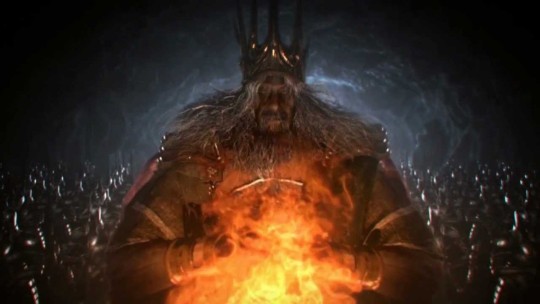
“There were giants in the earth in those days; and also after that, when the sons of God came in unto the daughters of men, and they bare children to them, the same became mighty men which were of old, men of renown.”
- The Book of Genesis, Chapter 6; verse 4
Now the last age by Cumae's Sibyl sung
Has come and gone, and the majestic roll
Of circling centuries begins anew:
Astraea returns,
Returns old Saturn's reign,
With a new breed of men sent down from heaven.
- Virgil, Ecologues
Because if starting off with a Bible verse and pagan Rome were good enough for Tinto Brass’s Caligula, they’re good enough for me. There’s really nothing like the Lords in Demon’s Souls; there was an age where things were objectively shitty, but that seems to be a running them of Soulsborne, if not dark fantasy as a genre. There’s a kind of similarity to the Shadowmen, but more in stature than anything else. The Pthumerians in Bloodborne have a lot in common with the Lords, but are obviously much more human and tragic.
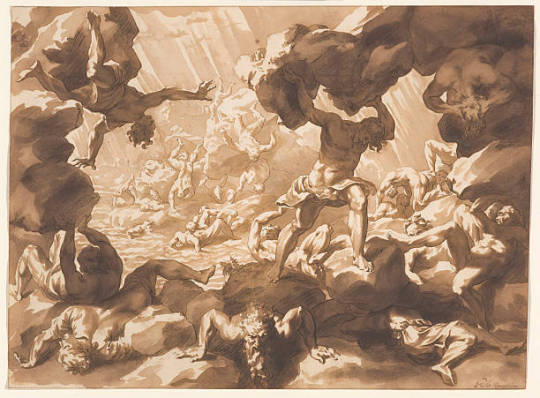
No folks, to understand the Lords, we have to go back. Way back. I know it’s kind of faux pas to see real-world mythology in every video game theory these days, but I feel like it can’t be helped. To understand the Lords (and why they’re so damn dig incidentally), you have to know about the Titans and the Greek Golden Age.
So I’m trusting that you all know your Greek mythology 101, right? The Titans were the gods before the Olympians (but after the Primordials). Deities of more abstract concepts like memory and and invisible air. Mostly literary figures, no actual base of worship. Anyway, the Titans were different from the gods in that they were bigger, stronger, mightier. But the gods were more numerous, and craftier, so they overthrow the Titans in a little thing called The Titanomachy. It actually ties in rather nicely with Dark Souls cyclical universe; Kronos overthrew his father, Ouranos, then Kronos gets overthrown by Zeus, and then Zeus devotes a considerable portion of his mythology living in fear of being overthrown by his children. (Keep that last bit in mind while we go on.)
It’s actually a pretty common myth across Indo-European mythologies when you look around. Before the current order of the universe, there were primordial beings, and the gods overthrew those beings to make the world as we know it. Odin and his siblings had to kill Ymir to make the world, and then later warred with the Vanir. Marduk and the other Babylonian gods killed Apsu and Tiamat. Shiva created his aspect of Virabhadra and defeats Indra, who himself had to kill the serpent-dragon Vritra to bring water to the world. There are even echoes of the narrative in Lucifer’s attempted rebellion against God. Also another recurring pertinent theme there; dragons. The primordial beings were often dragons or serpents.
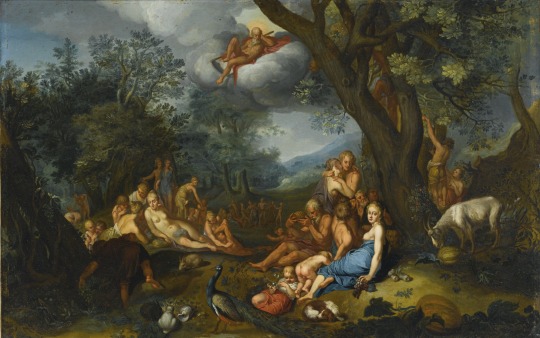
The thing of it is, this cycle of rebellion takes a toll on the world. After an initial period of chaos and darkness, sometimes there’s a patch where things are pretty sweet. Think the Garden of Eden; just humans crawling around, everybody’s naked and happy, the sun always shines, animals just lie down to get eaten, fruits fall right off the tree. Everything was Better then. And let’s be clear, when I say things were Better, I mean Better; even the humans were bigger and nigh-immortal and beautiful, because things were just that good back then. That’s the concept of the Greek Golden Age. The world started out great when the Titans were in charge, but the rebellion made things worse, and every age after that has gotten worse since then, spiraling on a course of entropy towards the end of the world. That part should sound pretty familiar.
That’s the Lords. The men of the Golden Age. The Titans. Bigger, prettier, stronger, longer-lasting, and all around better than you. Their cities filled with magic and technological wonders humans can’t even begin to reach. And the jerks responsible for setting everything in motion.
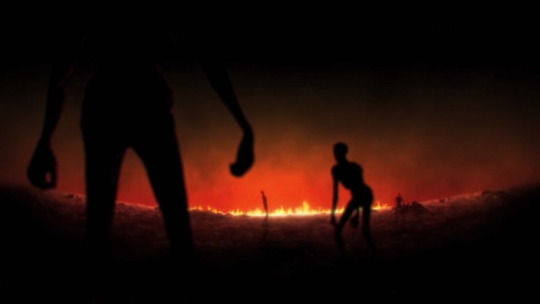
But where did the Lords even come from? The myth in the opening cinematic states, “And then, from the Dark, They came.” That’s ‘They’ with a capital ‘T’; They are important, and there’s only one important They in the Dark Souls origin mythology. The Lords, like all life (or unlife in Nito’s case) came from the Dark; but what does that mean? Did the Dark literally produce them out of itself, or were they living as a race underneath the Everlasting Dragons and Arch-Trees for years?
I think it’s important to remember that the Lords came from the Dark in the origin myth. Such a big deal is made of the gulf between Lords and humans as representatives of the Flame and the Dark, but they both came from the same place. It drives home that the only real difference between Lords and humans is circumstance. Humans really are just mutant, pygmy Lords descended from a single freak ancestor. Which makes you have to wonder; why are the Lords so superior to humans if they both came from the Dark? The most obvious answer is that the Lords derive some inherent advantage from their connection to the First Flame.
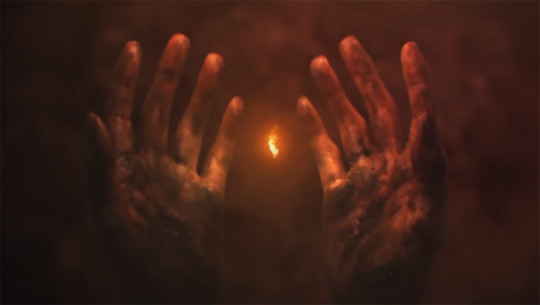
That also raises another question for me; how much of the Lords’ greatness stems from their own inherent nature, and how much comes from the Light Soul or The First Flame? If the Lords had never discovered the First Flame, would they still be at the same level that humans are at in Dark Souls, so to speak? Would they have giant cities and know all that advanced magic, or would they just be regular human beings? In Norse mythology, the gods of the Aesir aren’t entirely immortal; they can still die from violence, and they are even only immortal because they eat the golden apples of Idun. I’m not saying the Lords and the Aesir correspond one-to-one with each other, but Dark Souls does definitely draw from Norse mythology more than others. It might not be too far-fetched to theorize that the Lords are only special because of the First Flame. It’s their golden apple, so to speak.
Of course, we also have to consider the possibility that the origin myth is utterly fictitious. In that case, the Lords are probably a foreign population to Lordran. How they got there and where they came from is entirely up for grabs. Really, it still doesn’t change that much from the origin myth. The Lords arrived and fought against the Everlasting Dragons for supremacy of the world, or at least Lordran. They then found and harnessed the power of the force known as the First Flame, and with the help of Seathe defeated the Everlasting Dragons. Eventually, humans showed up, and even they don’t know where they came from.
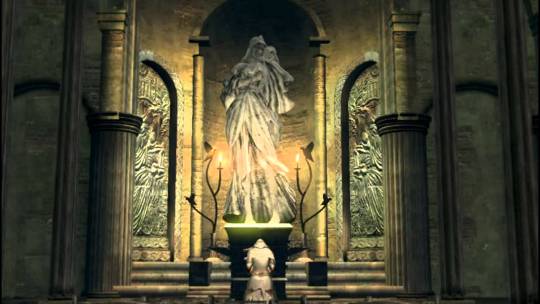
Which I guess is the lead-in to the Way of White. I want to give the Way of White a more close-up look with the rest of the factions later on, but they’re still important to the Lords. Humans showed up, and they allied with the Lords against the dragons, and later on against the demons. When exactly humans and Lords encountered each other is unclear; for all we know, humans were there with the Lords from the start, but I always imagined it as the humans becoming a significant enough power to be an asset to the Lords somewhere around the tail-end of the war with the Everlasting Dragons.
We know Havel fought along side Gwyn against both demons and dragons, and Havel was made a bishop in the Way of White. What I think is that the Way of White didn’t start out as a religious organization, or at least not in the model it’s encountered when we play Dark Souls. The humans were right there with the Lords, tangibly in their presence. The Way of White was originally the organization of humans sworn in service to the Lords; whether that was in terms of knighthood, priesthood, or both is unclear. Allfather Lloyd was presumably involved at some point in this process, but it’s hard to say what exactly he did or how much. As the Lords grew more distant from humans over the course of time, the nature of the Way of White changed into a more separated form of religion. The Lords, no longer present, became numinous, and were worshiped as proper deities, leaving us with the current Way of White.
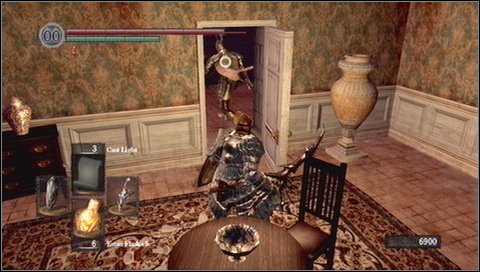
Except maybe not so much? It’s clearly evident by the furniture and rooms in Anor Londo that there was some human presence cohabiting with the Lords. It’s the beds that sell it for me; the steps are excuseable as Lord foot-size isn’t that far from humans, the door-frames would usually be a foot taller but aren’t unreasonable, and the chairs would be a tight fit but are manageable. But the beds are bunk beds for the Lords standing next to them; even a Lord comparatively as short as the Silver Knights would have their feet hanging out on those beds. Oh, and y’know, the obvious human presence with the Painting Guardians, but who cares about them?
What I always took this as was that the Lords kept human servants with them in Anor Londo. After all, what’s the point of being a god if you still have to scrub the floors? So living in Anor Londo was a population of humans who served directly under the Lords for whatever the Lords might need; soldiers, servants, and just general sources of adoration. Humans who worked for the Lords up close and personal, divested of the deific imagery (unless they were really committed to it).
It’s like... Remember Mad Max: Fury Road? You had Immortan Joe, and then you had the War Boys who worshiped him like a god, and at the bottom were the humans living on the ground who barely saw him and also treated him like a god because of all his power. And in between was the middle class of people, like the Brides and the Milk Maids and the Organic Mechanic; people who lived with Immortan on the day-to-day basis and saw that he was really just another man. That’s what I’m imagining this class of humans in Anor Londo were like, except a little bit different because the Lords really are near-immortal and super-powerful.
I’m guessing these people were basically slaves; conscripted to servitude for life. The kind of job that doesn’t exactly come with a severance package, if you feel me. Work for the Lords or get sent to Seath as a guinea pig, or black-bagged by Gwyndolin for heresy, or maybe just get eaten by the gargoyles (or Smough). Still, the cage is a gilded one at least; Anor Londo servants live like most other countries’ royalty, with fresh fruit, fine wine, access to higher culture, and spacious living. A significant step-up for most people in a medieval society. The population was maintained by allowing humans to actually live and reproduce in the city, passing work down the family line like a traditional medieval society. The Lords would want to make sure their human pets had an active breeding population to compensate for their comparatively short life-spans.
Whenever they needed (or simply wanted) more humans, the Lords could just snatch them up from the cities surrounding Anor Londo; Oolacile, New Londo, and the town that would eventually become the Undead Burg. You can almost imagine it; some random baker or wash-woman standing in the street, just doing their work. Suddenly, the clouds part, a beam of sunlight surrounds them, and a pair of winged figures carry the human up into the sky. The Way of White takes it as a sign; this person lived a humble, virtuous life, and was chosen to ascend and live among the gods. In truth, Gwynevere or whoever just needed someone to do the laundry. But the Way of White spreads the story, about how the gods raise those who live in the city up, and affirm that Lordran is indeed the land of the gods.
Eventually, the abductions stop, simply because there are no more Lords to want humans, and the human population in Anor Londo disappears (except for the Painting Guardians, somehow). Where did these humans disappear to? The Lords certainly didn’t let them free, or else more people would know Anor Londo is a ghost-town. Optimistic answer says the Lords took the humans with them when they left for wherever. Pessimistic answer says they slowly died off, and/or Smough went hog-wild.
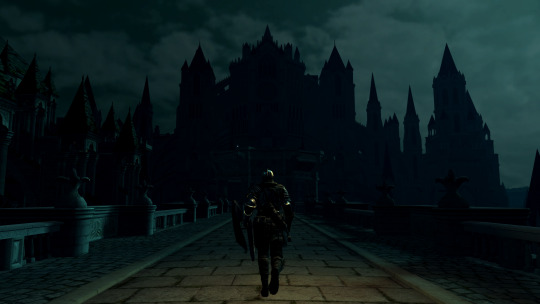
And that raises an interesting question that I’m really surprised I haven’t seen more people talk about. Because in wont of the streetwise Hercules to fight the rising odds, I have to ask; where have all the good men gone, and where are all the gods? What happened to the Lords? Where did they go? We know they left Anor Londo (well, most of them anyway); the Ring of the Sun Princess tells us so. But when, and why? The when is fairly obvious; some time after Gwyn went to link the First Flame by immolating himself. As the patriarch of Anor Londo and Lord society, Gwyn’s absence would cause Lord society to begin to radically alter, perhaps even disintegrating. Maybe the Lords were killed, but that just raises more questions; what force could possibly wipe out the Lords, and to what purpose? Darkstalker Kaathe? Velka? A vengeful Gwyndolin? All of them equally outlandish.
Assuming the Lords were still alive for their exodus, why did they leave? The best theory I can come up with is that the Lords feared Gwyn failed; he disappeared to the Kiln of the First Flame and never came back. Between the rising force of humans, the spreading plague of demons, and the encroaching Undead curse, the Lords decided to make tracks and leave Anor Londo behind for greener pastures. But that still leaves where? Maybe another world altogether? Maybe the Lords crossed the dimensional barriers somehow; broke through the Dark, followed the roots of the Arch-Trees, whatever. They found a new world and populated it, starting all over again. Maybe that’s where the Lords came from to begin with. Or maybe it really was as simple as going to another country; a lot less high-soaring, but more practical and a little more human. The Lords reduced to refugees, cast to the wind like everyday people. We’ll never really know, and there’s already too many maybes for this section.
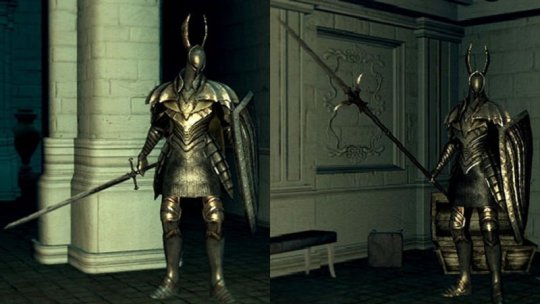
Not all the Lords are gone from Anor Londo, or at least something in their likenesses. The Silver Knights are still around, keeping watch over the city. From what we can see in the opening cinematic, the Silver Knights were the rank and file warriors of the Lords. The remaining Silver Knights are the Lord warriors who didn’t follow Gwyn to the demon wars and the Kiln of the First Flame. They’re not as tough as the Black Knights, and I think that goes in with the relative lack of combat experience.
The biggest debate about the Silver Knights in Anor Londo is whether or not they’re actually real. If you choose to attack Gwynevere, the Silver Knights and the giant guards msotly disappear with the rest of Gwyndolin’s illusions. Further, the Knights don’t appear to actually bleed or leave a body; they just dissolve into white mist while they disappear. This has led to the theory that the Knights, along with almost everything else in Anor Londo, are also illusions. The most common refutation to this theory is that the player is able to gain Souls and equipment from the Silver Knights, up to a complete set of armor and weapons.
But let’s consider; if the Knights are conjured up by Gwyndolin, that means they’re probably based in sorcery. Sorcery, as I’ve talked about before, comes from pure Soul energy. Ergo, it makes sense that once you kill Gwyndolin’s magically conjured knights, you inherit the Soul energy that was invested into their creation via whatever weird, unexplained process it is that the Undead absorb Souls. You can even explain the equipment with the Giant Blacksmith. Think about it; the Giant Blacksmith is one of the only real entities left behind in Anor Londo. He’s constantly working (somehow without fire...); most likely for the Chosen Undead’s benefit, but what if Gwyndolin had him working on side-projects, like equipping an entire regiment of phantom Knights?
However, there’s always the opposite theory; that these are real Lords, still hanging around after Gwyn and Gwynevere and whoever else left. Why would they be left behind? They might be a special contingency guard left behind to guard the city after the other Lords left, in case they ever returned, or to protect any secrets the city might have. Maybe they’re not even special, just general populace guards standing around, and there are even more Lords deeper into the city. When I first saw the Silver Knights, I assumed that the descriptions I had been given about the ‘gods’ leaving Anor Londo referred only to a particular subset of Lords, namely the royal family. Later, I thought these were just Lord guards who had been kept to guard the Anor Londo Cathedral and Gwynevere, the original members of the Princess’s Guard so to speak. When Gwynevere is revealed as an illusion, her guards leave Anor Londo heartbroken. The guards being living Lords doesn’t seem particularly likely to me now, but there’s nothing to 100% disprove it either.
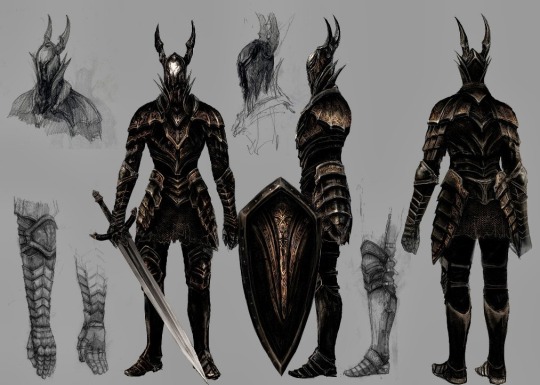
The Black Knights are real, though. Real and badass. Like, we need to sit down and take a minute to admit that none of us are worthy of how cool the Black Knights are. Which is saying a lot considering they’re all dead. The Black Knights are all ghosts or wraithes or some other kind of undead (but still not Undead proper). There’s a part of me that wanted to make a Warcraft joke where I said that maybe they’re Death Knights or Demon Hunters, but that’s actually pretty accurate. They got to be ‘Black’ Knights by fighting against the demons when the Bed of Chaos first popped up.
Gwen linking the First Flame did ‘em in super hard. It’s hard to say how much of them is actually still left in their armor. They just kind of wander the world now, finding places to hole up and guard. There’s not a lot of lore theories to work with on the Black Knights; their story is pretty straightforward. I used to think they were Gwyn’s agents, and that he directed them to go out hunting for the Chosen Undead, but now I don’t think the Black Knights could be commanded even if Gwyn was in any kind of state fit to.
There are still a couple of details I find interesting, though. First off, the Black Knights’ armor is distinctly different from the Silver Knights, namely the collar and the helmet. Now you could make the case that this is from standard Silver Knight armor being deformed in the heat of Izalith or the First Flame, but I think it was different even before the Black Knights fought the demons. My theory is that the Black Knights started out as Gwyn’s personal retinue of knights, handpicked as the best of the best. They might even have been dragon slayers like Ornstein; the horns on their helmets certainly look like dragon wings.
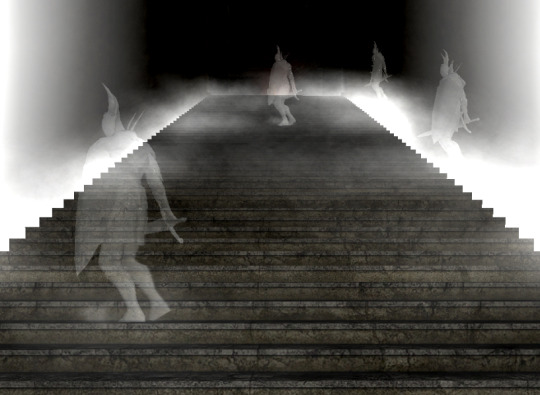
Second, at the entrance to the Kiln of the First Flame, we see legions of spectral Black Knights marching through. It’s hard to say just what exactly we’re looking at here. A part of me wants to compare it to the fight against The End in Metal Gear Solid 3, with the Chosen Undead seeing the spirits of all the Black Knights they’ve killed. Or maybe it’s that from the other side; this is where the souls of the Black Knights went when they were blown out by Gwyn linking the First Flame. I kind of personally always thought of this area as a space between worlds; the Kiln of the First Flame is terra prima for the whole Dark Souls cosmology, so it might not even be in Lordran proper. It has to be teleported to, or accessed through a portal. The space between Lordran and the Kiln is the same space between player worlds, or at least a way through it. It might not even be connected to an individual time-frame; if the Black Knights were forced into a space like that, between time and dimensions, it would certainly explain how they keep showing up through all the games set thousands of years later on, and it definitely speaks to the power of the First Flame.
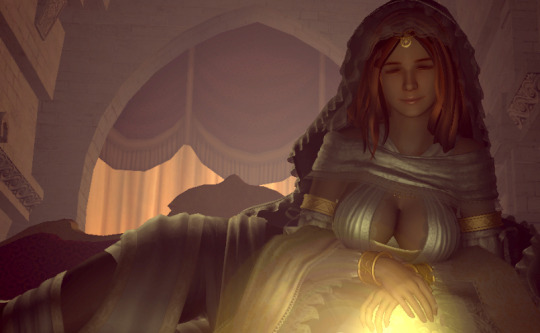
But enough about the small fry; it’s time to talk about the big fish. We’ll start out easy with The Magnificent Chest herself; Gwynevere. What we know about Gwynevere is that she is Gwyn’s (ostensibly) only daughter and referred to as The Princess of Sunlight; she was also one of the Lords to leave Anor Londo at some point, presumably around the time Gwyn linked the First Flame. In Design Works, Miyazaki talked about how he wanted Gwynevere to come off as a maternal figure, somebody the player would inherently trust and rely on. She was also supposed to talk through a mouth in the palm of her hand like Vamprire Hunter D, which would have been radical, but sadly got cut. Miyazaki also states that she wasn’t supposed to be so... err, buxom, I believe is the polite word, but the designer was so pleased with his own work that Miyazaki didn’t have the heart to tell him to redo it. I’m inclined to take Miyazaki’s word for it as women in Soulsborne usually come in either ‘svelte’ or ‘ogre’ body types, which makes Gwynevere even more of an aberration. And thus Gwynevere went from ‘maternal’ to ‘waifu bait’.
Which, if I’m being honest, I think actually works a little better within the narrative of the story. Gwynevere, as met in the game, is just an illusion conjured by Gwyndolin to commission the Chosen Undead into linking the First Flame. She spins a narrative so compelling that it comes off as too-good-to-be-true. You, the Chosen Undead, have truly proven yourself worthy, and must now defeat The Bad Guys to become the King of the Gods Forever and hey, maybe even mack on a giant hot babe. It actually tells us more about Gwyndolin than Gwynevere lore-wise; this is what Gwyndolin thinks humans want to hear, his impression of our fantasies. And I kind of took it as a more meta statement about video games, gamers, and fantasy tropes. Slay the monsters, rescue the princess, become the king; classic power fantasy. Tale as old as time. Gwynevere is even an actual, literal princess to boot. It’s so incredibly obvious that the only way you can’t notice it is by ignoring literally every other scrap of worldbuilding and lore around you, including the ring Gwynevere herself gives you.
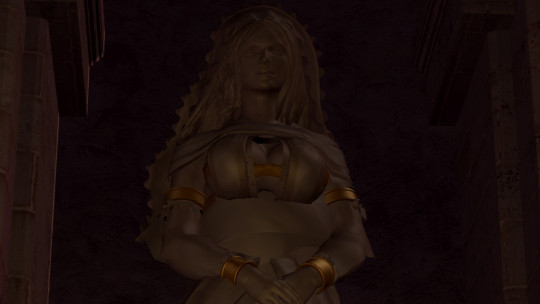
There’s actually a bit more lore to Gwynevere than the surface stuff. First and foremost, it should go without saying that Gwynevere probably wasn’t that gigantic. (I mean, it’s not impossible, but it’s definitely improbable.) Even Gwyn wasn’t that big, and he was king. That was probably a detail Gwydolin added on to make Gwynevere seem that much more overwhelming and important. Like the Greek Golden Age has shown, humans expect their gods to be bigger and better than them. And the bigger the god, the more important they are, so a giant would come off as absolute.
It’s also worth breaking down Gwynevere’s name. Gwynevere is actually one of the easier names in Dark Souls to discern the meaning of. Everybody of course knows it from Guinevere, who was King Arthur’s wife and the lover of Sir Lancelot in Arthurian legend. So Gwynevere is named after a beautiful, romantic, and tragic character who is practically synonymous with the idea of the fantasy queen/princess. It’s doubtful that Gwynevere was responsible for the fall of Anor Londo like Guinevere was for Camelot, but I digress. Examined closer, Gwynevere breaks down to ‘Gwyn-evere’. Gwyn is representative of both Gwyn, Gwynevere’s father, but is also derived from the Welsh ‘gwyn’, which means ‘fair’ or ‘white’. The ‘-evere’ part also derives from the Welsh ‘hwyfar’, which means ‘smooth’ or, alternatively, the old Welsh ‘sebara’, which roughly translates to ‘spirit’ or ‘magical being’. Either translation works, essentially amounting to ‘fair and smooth’ or ‘fair spirit’.
I also briefly want to talk about the theory that Gwynevere is the mother of Crossbreed Priscilla; I don’t buy it. Not only do I not buy it, I am actively confused by it. Where did people come up with this idea from? What evidence indicates it? Yeah, Seathe captured some of Gwynevere’s priestesses, I get that, but I think it’s pretty clear that Seathe will capture anything as fodder for his experiments. That’s circumstantial at best. You could just as easily make the case that Priscilla’s mother is Velka because she’s locked up in the Painted World of Ariamis with all the other Velka stuff. For all we know, Priscilla doesn’t even have a mother; she could have been grown homunculus style out of a test tube. Again, I’m not saying it’s impossible, I just think it’s improbable.
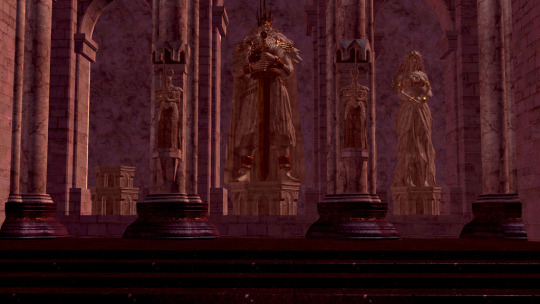
Gwynevere being named after a queen/princess also carries over to her epithet; the Princess of Sunlight. This is the role she is probably afforded in the Way of White and how she is worshiped. (Yeah, I’m a religious studies nerd. This is what I do.) Let’s consider Gwyn for a moment; Gwyn is depicted as the lord of sunlight and lightning. When you look at some of the shrines in Anor Londo, you see three spaces devoted to three gods; Gwyn at the center, Gwynevere to one side, and an empty space for what I’m going to pretend not to know belongs to The Nameless King. The point is, it’s obviously a trinity of the three most important gods.
Now, I would like to propose that in the Way of White, Gwyn’s children were (supposed to be) afforded different aspects of their father. The Nameless King would, if he was worshiped instead of exiled, play into the male archetype of the warrior-prince, and be given reign over lightning, thunder, and warfare. He would be kind of the masculine, aggressive aspect of Gwyn. Gwynevere, then, would be The Nameless King’s counterpart, representing a feminine, benevolent aspect of Gwyn.
When you look at Gwynevere’s miracles, they’re healing spells, and meant to be used on multiple people. Gwynevere, as a deity, probably would have represented all the good things that come from the sun; light, life, health, prosperity, and enlightenment. If she was comparable to any real-world deity, I would say she lines up closely to a female version of Apollo. Another comparison might be to Hestia/Vesta, the goddess of hearth and home. Like Hestia, Gwynevere’s priesthood seems to rely inordinately on women; it’s unclear if Gwynevere’s priesthood is exclusively female, but I do think that there are some direct comparisons to be made to the Roman Vestal Virgins.
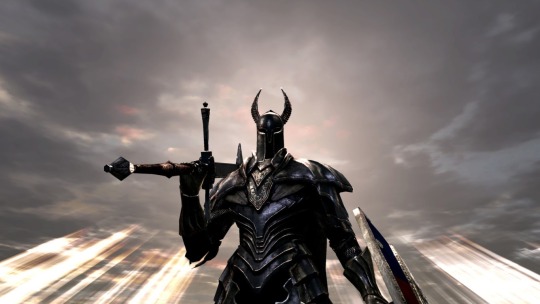
The Princess’ Guard is also probably worth a mention. Like most of the other factions, it’s hard to tell whether or not you see any actual members of the faction in game. As I said before, I always theorized that the Silver Knights and giant guards were members of the Princess’ Guard, maybe even with Smough and Ornstein at the top of the hierarchy as Gwynevere’s final defenders. The romanticized ideal of knighthood has a knight swear their fealty and love to a Lady; ergo, the Silver Knights, to fully embody the ideal of knighthood, would probably swear themselves to the only Lady around, the Princess Gwynevere. Of course it’s possible that the Princess’ Guard was just the name for the guards of Anor Londo without the whole chivalric oath thing. The illusion of Gwynevere appears to be the linchpin of the city’s illusion; defending that is tantamount to defending the city and everyone living there, even if unwittingly. Of course it’s all probably a moot point, what with the Silver Knights probably being an illusion.
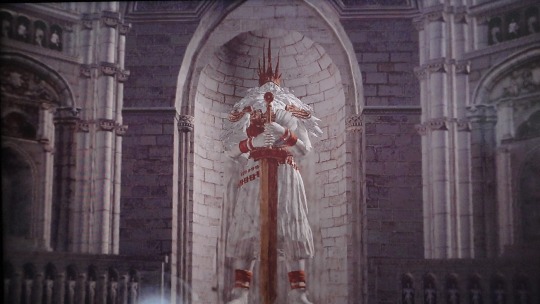
But knights don’t just swear themselves to a Lady; that’s so much romantic chivalry added after the fact. Knights, first and foremost, are knights because they swear themselves to a Lord, and when your entire race is called ‘Lords’, that means swearing yourself to the biggest and baddest Lord of them all. Which brings us to the man himself; I’m talking about the Grand Poobah, the Big Kahunah, Papa Smurf. It’s time to talk about Lord Gwyn.
The entirety of Dark Souls revolves around Gwyn and the consequences of his actions. So you can understand how it’s kind of hard to talk about him; not only could you feasibly tie every other single piece of lore back to Gwyn, but so much of his story has been covered before. I’d go so far as to say Gwyn’s lore is some of the easiest to find in the game. But that doesn’t mean it shouldn’t be examined again from a new perspective.
We’re introduced to Gwyn as the apparent king of the gods and hottest shit since sliced bread. Gwyn is at the center of the Way of White and worshiped as the lord of creation, along with all the other gods in Anor Londo. At some point, we receive the information that Gwyn has flipped off to somewhere to save the world by linking the First Flame, and left Lordran in chaos. Frampt says it’s up to the Chosen Undead to take Gwyn’s place and save the world; he is technically not wrong. Kaathe says that Gwyn has been keeping the humans under his boot and lives in fear of the coming of the Dark; he is also technically not wrong. They both also manage to work in some lies about a messiah narrative, which brings the lie-truth ratio to 2-1.
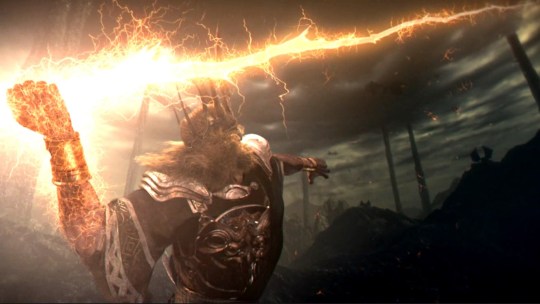
Gwyn falls very neatly into the deific category of The Sky Father; the patriarchal head of the divine family whose purview is all of reality, but with a definite focus on the sky, sun, lightning, and storms. Notable examples include Zeus, Odin, Marduk, Indra, Perun, and, everybody’s favorite, YHWH. I actually kind of love how deliberately Gwyn is made for this role. It’s so transparent that he’s built around this specific mythical archetype, but he still has enough characteristics to be unique. I want an entire pantheon built up like this. Anyway, I’m gushing; back to Gwyn.
Like all good Sky Fathers, Gwyn started out by fighting the primordial monsters and founding reality as we know it. Gwyn in particular appears to be a composite of Odin and Zeus, with maybe a little more from Odin given that while Gwyn has some very definite human flaws, they aren’t really in the same line as Zeus’ (re: he does not stick his dick into every moving thing). I’d also say that there’s a bit of King Arthur in Gwyn’s character, especially Arthur a la T.H. White, but it’s hard to say for certain; outside of ‘Gwynevere=Guinevere’, the Souls series isn’t really big on Arthurian legend. But Gwyn does have some of the same characteristics of Zeus and Odin, even outside his dominion over lightning. He definitely had some of their strengths; their regality, their wisdom, their leadership, and even perhaps some of their slyness. But with that also comes the overlapping flaws of Zeus and Odin; deceit, tyranny, callousness, vengefulness. Regardless of anything else, he still forced Gwyndolin into the role of a woman, and then hid him away like the deformed family cat.
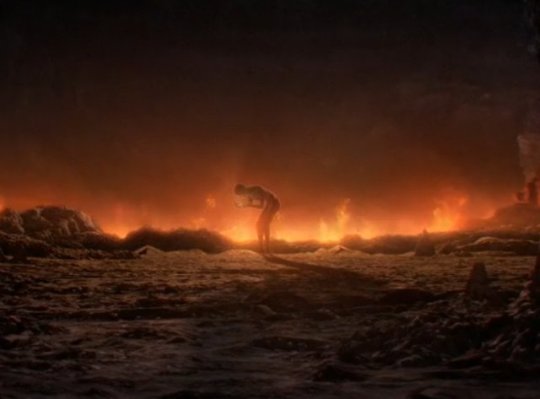
But I think the most important flaw that Gwyn inherited from his mythological predecessors, the one that defines him more than anything, is fear. Gwyn, like Zeus and Odin, is driven by an overriding fear. Odin lived in fear of Ragnarok, the Twilight of the Gods, when the universe would be destroyed. Gwyn lives in fear of the coming of the Dark, the unknown age where the world of the Age of Fire will diminish. Zeus lived in fear of his children repeating the cycle of violence that was inherent to his family; Zeus overthrew Cronos, Cronos overthrew Ouranos, and Ouranos had overthrown Gaia. So Zeus, naturally, lived in fear of whatever new god or demigod might overthrew him. Paralleling that is Gwyn living in fear of the humans overthrowing the Lords, casting him down just as he cast down the Everlasting Dragons. These fears, of apocalypse and rebellion, are what drove Gwyn to desperation, and eventually, to his own demise.
What exactly Gwyn was afraid inevitably informs us of how sympathetic a character he is. (Well, at least it does for me.) What did Gwyn think the coming of the Dark would entail that drove him to sacrifice himself, his friends, his family, and his kingdom? If he thought it was just the rise of humanity, the Lords being supplanted as the dominant species in Lordran, and he worked to make sure that the human slave race stayed was kept down, then it’s hard to view Gwyn as anything but an antagonist. We learn from the dialogue given by the Four Knights and Gwndolin that Lord opinion of humans is, at best, a kind of benevolent contempt.
But what if Gwyn thought an Age of Dark would be a literal apocalypse, like Gwynevere/Gwyndolin described? If Gwyn viewed the work of the Age of Fire as being civilization and existence itself, then the opposite of that would be nothing short of total destruction similar to the Norse Ragnarok; the world falling into literal darkness, life returning to animalistic savagery before fading away all together, and eventually reality itself being consumed by the void. That perspective makes Gwyn much more sympathetic; who wouldn’t give everything to save the world? The truth, of course, is probably somewhere in between.
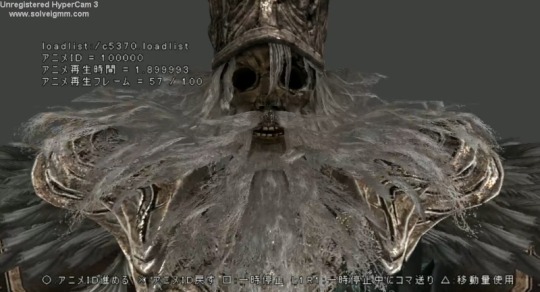
At some point, Gwyn began dolling out shards of his own Lord Soul among his more trusted followers. First and foremost, this confirms that, like the Dark Soul and the Chaos (Life) Soul, the Light Soul can be divided and spread. Second, the Soul of Ornstein does indeed clarify that Gwyn originally did this as a reward for certain individuals. This represents more than a reward of mere power, but an actual bestowal of divine authority. By inheriting just a little bit of Gwyn’s power, the shard-holders have essentially received a share in being the Lords of Lordran. If you want to get all chivalric about it, it represents the knights being giving divine authority by their king, himself a conduit of the divine. It’s even more literal given that Gwyn is an actual Lord.
The Four Knights are obvious choices, but there was also Seathe and the Four Kings. The Four Kings are the ones that still interest me, because as far as we know the Four Kings were human. Gwyn might have feared the humans, even hated them, and yet he still trusted four enough that he literally divested him with his own divine power. It might be that Gwyn gave the Four Kings the shards of his Lord Soul because he originally trusted humans, and even considered them his allies. But then the power of the Dark began to show itself; it corrupted the Four Kings, destroyed the Four Knights, and empowered the Occult Rebellion. Gwyn’s opinion of humans changed, souring into that fear and hatred. The threat of the Dark became more apparent than ever, and Gwyn knew he had to do something to stop it.
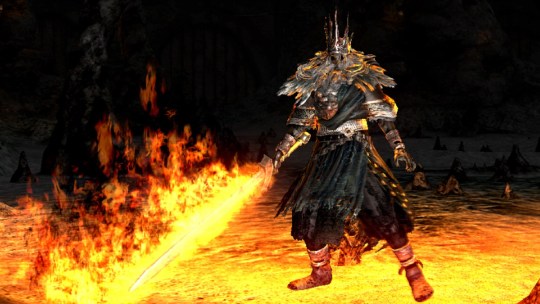
I like to imagine that it started with the Witch of Izalith, that Gwyn commissioned her to try and help him find some way to keep the Age of Fire going. That backfired, or at least that’s the version we got in the game as it shipped, but the different versions of Izalith and the demons is a whole other barrel of fish. One way or another, Gwyn understood that he would have to solve the fading of the First Flame by himself. You have to wonder how he deduced how to link the First Flame; did he learn it from the Witch’s failure? Or did he figure it out from the Rite of Kindling, watching bits of Humanity act as fuel? Either way, Gwyn knew that the best thing to keep the First Flame going would be its most important and powerful component. And so Gwyn made the decision to offer up that component, his own Lord Soul, to keep the Age of Fire going.
It’s still not entirely clear what it is we find in the Kiln of the First Flame when we find Gwyn. How much of Gwyn is left in The Lord of Cinders? Does he still think, or is it just a mindless husk acting on instinct? That would certainly explain why he’s so aggressive, but he displays an inordinate amount of strategy and skill for what amounts to a zombie. Perhaps, if Gwyn is still sentient as The Lord of Cinder, he attacks the Chosen Undead because he wants to test them, to see if they are truly worthy to link the Flame. Or maybe he’s still sentient but insane, mad from pain and sorrow.
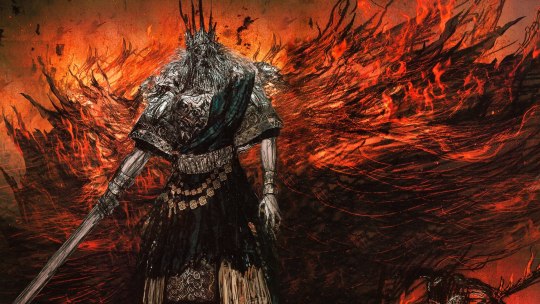
And how long did it take for The First Flame to consume Gwyn’s Lord Soul? That might seem like a minor issue, but I feel it makes a difference from a character perspective. If the First Flame just swallowed up Gwyn’s Lord Soul in an instant, then I have to say, I feel slightly less sorry for him. That might sound harsh, but, narratively speaking, dying for something is easy. Dying period is easy. Dying is so easy that you’re doing it right now while reading this, without even trying. But living for something takes work. Living is hard, full of sweat and blood and tears. When we kill Gwyn, we get his Lord Soul, which I always translated as meaning that the First Flame wasn’t done consuming it. Gwyn didn’t die in a flash; he’d been dying for the last thousand years, letting the First Flame slowly burn him from the inside out.
Gwyn was so afraid of the Dark that he had let himself been immolated alive for a whole millennium. And to me, that makes the fight with Gwyn that much more meaningful; the Chosen Undead isn’t killing some tyrant who took the coward’s way out, they’re killing someone who was formerly proud and noble but is now so consumed with fear that they were willing to kill themselves in one of the most painful ways possible over the course of centuries. We come again to that reminder; the Lords and the humans are not so different from one another. They are both capable of committing evil and making dire mistakes. When the Chosen Undead looks at Gwyn as The Lord of Cinder, they are seeing a reflection of themselves.
That’s the thing about the Golden Age. A lot of people through history have focused on Diomedes’ theories about how the ages of man are proof that every succeeding generation is worse than their own, without really looking at the moral. But the moral, the real truth that Diomedes wanted to reveal with the ages of man, is that yes, things are getting worse; so enjoy today. It’s pointless to try and fight the cycle of entropy, so don’t ignore the good things you have now. And I feel like that’s a core moral of Dark Souls; Gwyn tried to fight the cycle of entropy and lost his family, his friends, and his kingdom. Meanwhile, Manus, holder of the Dark Soul itself, just lay down quietly in a grave after a life well-lived. (Y’know, until his own people raised him as a horrific abomination.) There is nothing that anybody can do to defy the cycle of entropy, so hold on to what is dear as best you can.
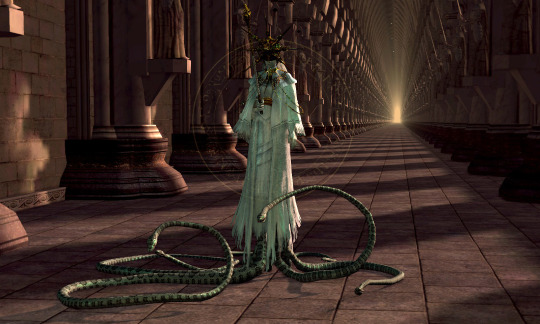
And that’s where I’m going to leave on this one, because it’s long overdue. “But wait!” I hear you say, “What about Gwyndolin? What about Smough and Ornstein? What about Velka?” Well, don’t you worry. Because when I said I wanted to do some mini-lore (or just more regular lore) ramblings, those are exactly who I had in mind. So stick around for more Lordly goodness!
167 notes
·
View notes
Text
Hypable Tease Breadown:
Here is my quick breakdown/thoughts on the Hypable Teases.
The Emperor is mad
After Sinara’s rather abrupt death in last week’s episode, it’s finally time for Kasius to take his place as the Big Bad in Agents of S.H.I.E.L.D. 5×10. And if you thought this wannabe deity responded poorly when his pretensions to God-hood were rejected by the lowly humans, believe me — you ain’t seen nothing yet.
“Past Life” goes full-on Caligula crazy with Kasius, so extremely that it would be funny if it weren’t straight-up freaky. Kasius’ already grand monologues are cranked up to eleven, peppered with random acts of violence and more than one diabolical plot. But will Kasius’s rage lead him to fiddle fruitlessly while the team burns the Lighthouse around him, or do his plans have sharper edges than we previously thought?
From my promo breakdown, Kasius most definitely goes into final boss mode tomorrow. He’s going to have more that a few tricks up his sleeve from his Seer (Loop Elena), some sort of weapon or drug that makes his and Tye’s eyes go all black, and I also wont’ be surprised if he’s got the monolith pieces stashed somewhere. Kasius has been one of my favorite villains on the show so his terrifying curtain call will not disappoint.
‘Agents of S.H.I.E.L.D.’ goes ‘Walking Dead’
A subtly-referenced element makes its proper debut in Agents of S.H.I.E.L.D. 5×10, and quickly presents a bloody new challenge for our agents. But that’s not the only part of this episode that recalls the motifs of The Walking Dead. In addition to the violence, “Past Life” makes full use of its title and takes the time to contemplate the fallout for those who return to life from death — a conversation that has wider relevance than we might initially think.
As someone who has never seen the Walking Dead I could be missing something big like Kasius has some sort of undead army and those with the black eyes have had the serum and will go into some sort of scary battle mode at some point. But Tess, Daisy, and Coulson have all done this and last week Tess was clearly uncomfortable and I can see that being explored more. The bigger part I think this will speak to is Loop Elena and how many time Kasius has brought her back.
Deke makes a stand
Whatever you think of the (somewhat half-heartedly) enigmatic Deke, “Past Life” will give you a new perspective. Deke has spent the first half of this season being dragged kicking and screaming along with the agents’ adventures, but in Agents of S.H.I.E.L.D. 5×10, he finally stands up and makes a solid choice of his own.
In doing so, Deke profoundly effects the events of this week’s episode, as well as the story going forward. It’s a refreshing development for the character, but don’t worry; there is still plenty of mystery left hanging around this scruffy-looking nerf herder to satisfy the most speculative of fans.
AKA some questions will be answered but not all with a bigger mystery looming with him. Possibly a bit more of his backstory and likely some more teases of a possible Fitzsimmons connection. I am thinking whatever he does is good and possibly saves someone at a crucial moment, last week he could have let Daisy get killed by Sinara but chose to save her. This is one of the pieces I am most anxious to see play out because I desperately need to get a better read on where they are going with Deke.
Deke is also high on my list as the one that takes out Kasius.
Seer sights
Here’s one mystery that won’t linger for long, though. The identity and circumstances of Kasius’ recently-mentioned “Seer” are integral to the events of Agents of S.H.I.E.L.D. 5×10, and the consequences are truly breathtaking. Yes, there is an unexpected clarity cast on the confounding problem of the timeline (future? past? time loop? destiny? WHAT?) but there is also a marvelous emotional fallout. This is territory that Agents of S.H.I.E.L.D. has never visited, and the show pulls off a challenging development with grace, sensitivity… and revelations that will leave your heart pounding.
It’s Loop Elena and she was captured when she left May to go fight.
The full fall out from that is going to hurt. I won’t be surprised if the Inhuman program wasn’t started using Elena’s blood.
More painfully is she could reveal what happened to everyone in from her loop Daisy, Mack, Coulson, May, and Fitzsimmons (so be ready for more doom and gloom teases there) but even worse something she did/gave Kasius lead to their deaths and allowed the Kree more and more control.
She could also offer up other revelations that will loom over the team upon their return home.
Daisy is already burdened with the thought she destroyed the world and Elena would also have to deal with knowing her future self caused something terrible. Her giving up information on the team (and who knows what else) to Kasius, knowing what happened to Mack in the past, and nearly losing him will all take their toll. I honestly won’t be surprised if she resits coming back as well or if she takes off when they get home.
Mack will also be devastated.
Expect and even bigger twist to come from the reveal. Something that will have consequences long after they get home.
Coulson has an idea
Our prime director of S.H.I.E.L.D. has kept things on the down-low over the past few episodes, mostly content to follow his team’s logical plans and bark out decisive orders. But “Past Life” isn’t playing like that anymore. With the team so close to achieving their goal of building a magical monolith to travel backwards in time and save the planet, Coulson snaps back into Executive Decision Mode.
And boy, does he execute those decisions. Boy, oh boy, oh boy.
Well one will be knocking Daisy out and dragging her through the portal whether she likes it or not.
When Coulson goes into full on Director mode is when things really start to happen, get done, and get them home.
53 notes
·
View notes
Text
Pass Your Psych 101 Course with Anime: The Battle Against Repression in Caligula
Hands up, who here would actually have a long listen to Ritsu's impromptu psychology lectures? No? That's fine. If you're on board with this season's adaptation of Caligula, consider a general education in psychology effectively snuck into your weekly entertainment, since there's a lot to learn about the human psyche when it comes to this series. That's not even counting the in-depth episode titles.
A lot has changed between the game and anime iterations of Caligula, but one thing that's stayed very much in place is the Catharsis Effect. For those reading along who may not be in tune with either the show or the game, a Cartharsis Effect is a dark (and rather painful) super power that erupts from within a person once they're in touch with their true self. In the world of Mobius, that's their forgotten -- and not necessarily good -- self.
If you happen to be a fan of Jung (and you may well be if you're watching Caligula), you might already be seeing the telltale signs of a "Shadow" story. If you're not... well, you've found the right series to lay the concept out for you!
Carl Jung defined the human unconscious as a pastiche of universal Archetypes, which appear in all our myths and stories regardless of culture or time period . Explaining all of them would take longer than even the Go-Home Club has at this point, so we'll zoom in on the focus of Caligula, which also happens to be one of the most daunting Archetypes to deal with: our Shadow. The reason it's the most daunting to deal with? It is, by definition, what we hate.
Everyone has a Shadow, no matter how good or kind or self-aware they are. In fact, dealing with it may be even harder for the best and kindest among us. Because our Shadow is a collection of those darker elements of ourselves that we don't want to associate with. They're the thoughts, motivations, and aspects that we don't want as a part of ourselves, and thus try to hide or get rid of.
There's just one problem: you can't ever get rid of a Shadow, and trying to do so just makes things worse.
Now look at the world of Mobius: a world where everyone can be their best, happiest, most perfect self. A world where, for as long as μ is awake and well, everything is fine. You don't have to think about whatever negative part of yourself you left behind in the real world. You can be yourself but better. You can be a cute girl instead of an older man, or a ladies' man instead of an awkward nobody. And you never have to think of the side of yourself you're ashamed of.
In other words, you never have to confront your Shadow. And if we never confront our shadow, according to Jung, we never mature. Which might well explain why the players of Mobius are living an eternal high school life.
Growing up, becoming your best self, requires you to confront your Shadow. Not to destroy it, but to accept it. Think of the Go-Home Club's Catharsis Effects: shadowy extensions of themselves that are painful to summon, but powerful when accepted. And they come, at least for the most part, from remembering and acknowledging their respective pasts.
But what about the Ostinato Musicians, the most powerful people in all of Mobius? Well... they're not, are they? We learn that when μ is asleep and Mobius is left to its own devices, only those with their own strength can hold up. Anything constructed by μ will begin to wither; but anything geniune, from within oneself, will thrive. The Ostinato Musicians shoved aside their Shadows, looking for fulfillment in the world of Mobius. So when that fulfillment fails, they have nothing.
Caligula isn't particularly unique for using Shadows as a major plot point, but the way in which they evoke the idea does teach us -- both on the nose and under the radar -- a lot about the concept. You'll see it show up in everything from high fantasy to buddy cop films, but using it as a central mechanic for gameplay and worldbuilding tells a whole different story. It's a fresh approach to a basic underlying concept of both storytelling and psychology. And even if you don't realize you're taking it in, you are.
Of course, listening to Ritsu's rambles will clue you in to other concepts in psychology. But even he seems to be slightly unaware of just how deeply his own story is steeped in one of the more all-encompassing aspects. And while our own real-world dealings with our own Shadows don't come with pretty flowers and sick weapons, they are very real and very important.
What have you taken away from Caligula in your viewing? Tell your fellow Go-Home Club members in the comments!
>> Watch Caligula on Crunchyroll
-----
Kara Dennison is responsible for multiple webcomics, and is half the creative team behind the OEL light novel series Owl's Flower. She blogs at karadennison.com and tweets @RubyCosmos. Her work can currently be read in Stranger Tales of the City from Obverse Books.
0 notes
Text
Tower of Nero Reactions
Tower of Nero absolutely wrecked me, exactly as I knew it would, but I can now say -- without a doubt -- that Trials of Apollo is my favorite Riordan series by far. It feels like a fitting ending in many ways, a capstone to an amazing journey that started back in 2005 (not that I’ve been around quite that long, lol).
Anyway, below the cut are some of my thoughts on this last book. Emotional roller coaster is an understatement, and I am still very much processing. (Also, I will keep tagging Tower of Nero spoilers until the end of November, just fyi.)
I don’t even know where to begin. This is going to be a long post...
I’ll start with the good news: ✨💜✨💛✨NERO✨💛✨💜✨
Not even kidding, I will never shut up about Nero. Trust me, if you told past me, at the very beginning of ToA, that in 2020 I’d be stanning Nero, I wouldn’t have believed you. Nevertheless, here I am.
Obligatory shout out to Pajama Nero, the moment I knew there was no going back 💜
I actually high key appreciate how the Triumvirate’s power was handled. I assumed as much at the end of Tyrant’s Tomb, but for Commodus and Caligula’s power to consolidate in Nero was perfect.
I’m trying not to scream about Nero, I promise. He’s just? God tier. Literally. 💛
The ultimatum? Throwing a party while NY burns? Even Dionysus said Nero has panache. His interior decorating and architectural sense? Impeccable. 💜
Ngl, Luguselwa betraying Nero had me VERY nervous until he completely called them out. His entire monologue? “I’m afraid your hands have offended me.” ??? 😳
Let’s be honest: every throne room scene killed me. Every line Nero had killed me. Why is he Like That?
How Nero made himself a metaphorical Kronos? Poetic cinema.
FaceTime Nero TM
The Sassanid gas was an absolute Power Move just btw
THE IMPERIAL HOUSEHOLD 💛
Nero and his fucking Purple Sofa TM
THE REMOTES !!! Dumb tech boiiiiiii 💜
When Lucius stabbed Apollo? So fucking proud of him. Next time, hit something vital, sweetheart. 🗡
You don’t know how hard I laughed when Apollo shot Nero directly in the face and Nero just glared at him and yelled “stop that!”
The Bee Gees TM
WHEN NERO CATCHES NICO’S SWORD WITH ONE HAND ?
HE BLEEDS ICHOR. ACTUAL, GOLDEN ICHOR.
WHEN HE BACKHANDS NICO ACROSS THE ROOM !
WHEN IT SEEMS AS IF HE PUSHES THE RIGHT BUTTON AND EVERYTHING IS OVER ?
Perfect Moments Do Exist 💜💛💜💛💜💛
Ofc, Will and Co. had to show up and ruin everything. Nero Panics TM and he is such a Baby TM ???
His fasces tho,,, ✨
HE GLOWS ? SHINY RADIANT SUN BOI ? ✨☀️✨ Commodus who? Caligula who? Nero said fuck Will Solace rights. How dare anyone outshine him in his own throne room? 💛
I should say something other than “Nero is a god” huh,,,
Making Nero tear apart his own fasces? I’d noticed that Riordan included the fact that Nero committed suicide in the glossary since book 1, and,,,yeah I was scared something like this would happen. Not this. This was worse.
His death scene? Oh my gods, I was a complete mess. How dare Apollo revoke Nero’s divinity? How dare Nero be burnt by his own divine power? How dare his last moments be spent sobbing, terrified? How dare Python literally drag Nero’s essence to Delphi and absorb it? *on the verge of tears*
I’m not going to get super into this rn, because it’s complicated and I’ll start crying again, but Python being the evil behind it all? The snake playing his own game, using both Apollo and the emperors as pawns? Whatever horrific power he had over the Triumvirate, and over Nero specifically? Nero taking it upon himself (for selfish, terrible reasons, yes) to step in and make sure that Python didn’t destroy humanity? When Nero, even with all his power, was fucking terrified of Python? I-
In Other News
I’ll be nice. Good for everyone who got their happy ending. I think Apollo’s “check-ins” were written fairly well. I think his personal feelings regarding being a god again were handled well in relation to his story arc.
How Apollo addresses the reader in closing? Oof.
Me @ Nico, Will, and Rachel specifically: Never Talk To Me Or My Romans Ever Again
Oh btw, I Am So Tired Of Hearing The Name Jason Grace. We get it. He’s a hero. Pls shut up.
What hurt the most, I think, is the way Triumvirate Holdings / the Imperial Household was handled. I knew it wouldn’t be done well. It still hurts.
We get some throwaway lines about Meg maybe inheriting the tower, CHB getting the Greek fire, the Germani being “regular people” but like,,, No?
Triumvirate Holdings is the largest, most influential company on the planet. Nero directly mentions the issue this poses: “You can’t destroy bank accounts with a bow and arrows.” All of that? Just? What? Isn’t a big deal?
I refuse to believe the Germani are just peachy integrating into society.
I refuse to believe the Imperial children are just peachy potting cacti in Palm Springs.
^ All of this will get its own post, because I’ve written posts about it before that I should follow up on. I’m just Bitter.
When Dionysus said “it appears some of us do get happy endings” I Felt that.
I suppose that’s the general overview. I’ll start posting my trash memes soon and work on like,,,real posts. This is also an open invitation to come yell at me btw!
#trials of apollo#toa#tower of nero#tower of nero spoilers#filodox!#so yeah I maybe fell harder for Nero than anyone could have anticipated#though I feel like I should have anticipated it#it was inevitable#no I do not take criticism#honestly if you don't want to see me stan Nero this is your warning#I have so much cursed shit to post
10 notes
·
View notes